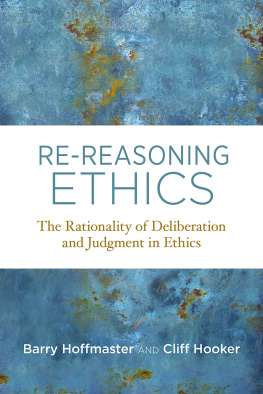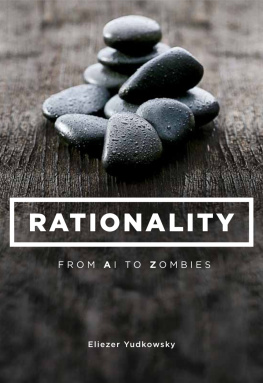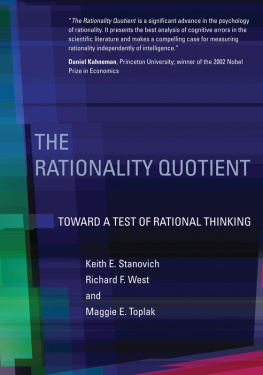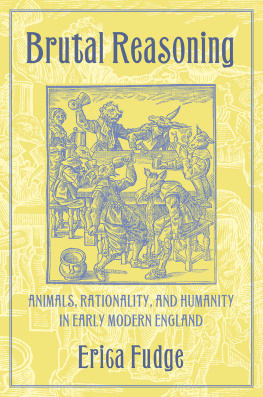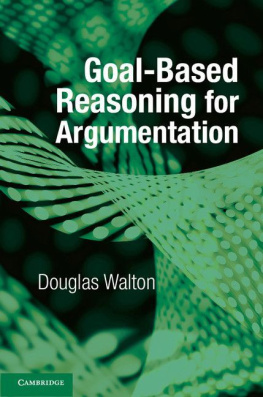RATIONALITY AND REASONING
Rationality and Reasoning
Jonathan St. B. T. Evans
University of Plymouth, UK
David E. Over
University of Sunderland, UK
Copyright 1996 by Psychology Press
All rights reserved. No part of this book may be reproduced in any form, by photostat, microform, retrieval system, or any other means without the prior written permission of the publisher.
Transferred to Digital Printing 2011
Psychology Press, Publishers
27 Church Road
Hove
East Sussex, BN3 2FA
UK
Psychology Press is an imprint of the Taylor & Francis Group; an Informa business
British Library Cataloguing in Publication Data
A catalogue record for this book is available from the British Library
ISBN 978-0-86377-438-6 (Hbk)
Cover by Clearwater Design, Hove.
Publishers Note
The publisher has gone to great lengths to ensure the quality of this reprint but points out that some imperfections in the original may be apparent.
There has been a dramatic increase, on both sides of the Atlantic, in contributions to the psychology of reasoning: research into how people actually think rather than how they ought to think. It has even justified a new journal, Thinking & Reasoning, devoted exclusively to this topic. Incidentally, the editor of the journal is the first author of this book. It is of passing interest to note that the origins of this research have been due to luck and play, not, as some authorities assume, a concerted attack on the grasp of deductive reasoning. What started as a perplexing puzzle has now been polished and consolidated into a wide variety of complex theories.
The bored psychologist glancing at the shelves marked cognition in the local bookshop, might catch sight of this book and inwardly exclaim, Not another book on reasoning!. Such a dismissive reaction would be plausible, but entirely wrong. In my view, there are at least three features in this book which merit more than a cursory glance.
First, the book is a collaborative effort between two people who have different backgrounds in psychology and philosophy. Jonathan Evans is a distinguished experimental psychologist whose work has spearheaded research on reasoning for some time. David Over was originally a philosopher who has increasingly worked with psychologists on decision theoretic analyses of what had been seen as pure problems in reasoning. His papers with Ken Manktelow have helped to illuminate deontic versions of the Wason selection task. Even more recently, he and Jonathan Evans have started to integrate work on reasoning and decision making in new ideas about indicative versions of the task, the most formidable and intractable of all the problems in the field.
What has been achieved by this collaboration is a liberation from the conventional wisdom of the dominant group, and an appeal to regard reasoning behaviour in a wider focus. Johnson-Laird and I have always invoked propositional logic as the normative standard for judging performance, but the present authors distinguish between Rationality which is basically a generally reliable way of achieving goals, and Rationality2 which is achieving a goal sanctioned by a normative theory (e.g. logic).
The second reason for commending this book is that it draws not merely on the reasoning literature but on the decision making literature. Decision making is concerned intrinsically with probability rather than deduction. It has acquired its own sophisticated mathematical methodology, but to invoke both traditions to tackle the same empirical data may be regarded as a daring step. We like to keep our nests immaculate, and not muddied by a different tradition, even if we are totally unaware of this penchant.
A third point of interest lies in a study in which I was privileged to work with Evans (Wason & Evans, 1975), discussed in the final chapter of this book. Its results show a marked discrepancy between the causes of peoples actions or decisions and the explanations that they offer for them. This has similarities to the annotations of a chess master which claim to be objective but are frequently rationalisation of a line of play already accepted (or rejected). The concept of rationalisation originates, of course, in a psychoanalytic context where it is regarded as justifying unconscious wishes, demands, etc. In such cases the choice, or decision, is invested with prior meaning or emotion. However, the results which Evans and I obtained in two experiments were based on that trivial material (circles, triangles, etc.) so beloved by the cognitive psychologist. Furthermore, the written protocols in our experiment suggest that what looked like a fluctuation of insight from one test to another, was really governed by a prior non-verbal choice. While the limits of such dual processing have not yet been fully established, the current volume contains new and valuable discussion of the role of tacit and explicit thinking.
Not all of us in the firm will agree with everything claimed by the authors. How could it be otherwise? For instance, I am inclined to agree with some criticisms recently made about an experiment of mine published nearly 40 years ago, but such criticisms overlook an unanticipated, qualitative result which makes the study a unique example of obsessional thinking under controlled conditions. However, this was a one-off experiment which has led only to methodological debate. Nevertheless, I hope enough has been said to show that this book is a fertile ground for others interested in cognition and epistemology. May it meet with the success it deserves.
Peter Cathcart Wason
Oxford, February 1996
Readers may be interested to know how a collaborative book between a psychologist and a philosopher living some 400 miles apart came to be written. The first author (JE) has been active in researching the psychology of reasoning since the early 1970s and has made a particular study of biases in reasoning, the subject of an earlier book in this series (Evans, 1989). To his continuing puzzlement he found that many authors in the field were attributing to him a claim that such biases implied that human beings were irrational. Not only were such claims absent from JEs publications, but some pretty clear statements to the contrary had actually been provided. For example:
The view that I wish to argue here is that errors of thinking occur because of, rather than in spite of, the nature of our intelligence. In other words, they are an inevitable consequence of the way in which we think and a price to be paid for the extraordinary effectiveness with which we routinely deal with the massive information-processing requirements of everyday life. (Evans, 1989, p. 111.)
The second author (DO) is a philosopher who has been active in the psychology of reasoning for some years and who regularly defies the rules of the philosophers union by running experiments. His interest developed through collaboration with the psychologist Ken Manktelow, and, in 1993, he and Ken edited a volume on rationality to which a number of leading researchers, including JE, were asked to contribute (Manktelow & Over, 1993). In his chapter, JE took the opportunity both to respond to some reviewers of the 1989 book who had criticised it for avoiding the issue of rationality, and to deal with the broader question of what implications research on reasoning biases has for human rationality This led to the first presentation of the distinction between two definitions of rationalityrationality1 and rationality2which are discussed at length in this book. The basic idea is that one may be rational in terms of achieving personal goals (rationality!) without being rational in the sense of conforming to a normative system such as logic (rationality2). DO had been working for some time on the idea that behaviour on some reasoning tasks could be better viewed in terms of decision processes rather than as logical reasoning. JEs distinction thus struck an immediately sympathetic chord and instigated a series of discussions that led first to some collaborative papers and eventually to the current volume.
Next page


